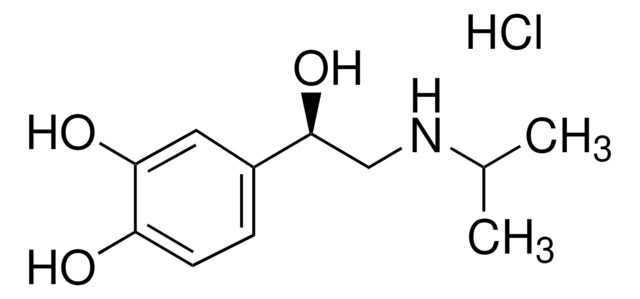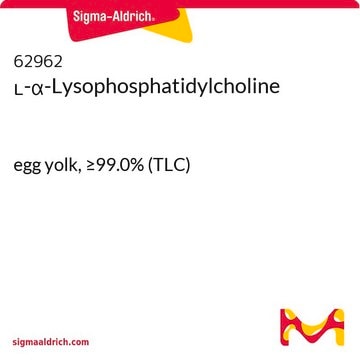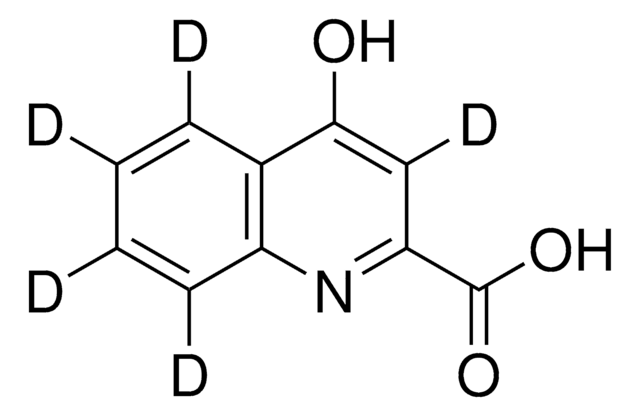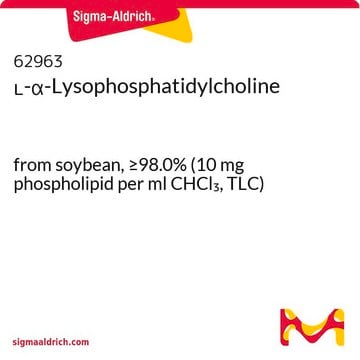L1381
L-α-Lysophosphatidylcholine from bovine brain
≥99%, Type V
Synonym(s):
1-Acyl-sn-glycero-3-phosphocholine, L-α-Lysolecithin
Sign Into View Organizational & Contract Pricing
All Photos(1)
About This Item
Recommended Products
description
zwitterionic
type
Type V
Assay
≥99%
lipid type
phospholipids
storage temp.
−20°C
General description
L-α-Lysophosphatidylcholine is a major plasma lipid, derived from phosphatidylcholines that includes glycerol and sphingoid based lipids with one fatty acid. It is an important cell signaling molecule for G-protein coupled receptors.
Application
L-α-Lysophosphatidylcholine from bovine brain has been used:
- to determine the dose-dependent high-mobility group box 1 (HMGB1) release in macrophage and monocyte cultures by production of lysophosphatidylcholine (LPC)
- for lysolecithin demyelination of mice brain tissue
- for demyelination of axons
Biochem/physiol Actions
L-α-Lysophosphatidylcholine possess cytotoxic effects and is present at high level in ischemia and atherosclerotic aortas.
Lysophosphatidylcholine is a major component of oxidized low density lipoproteins, and has been implicated in various inflammatory reactions, including atherosclerosis. It is a degradation product of phosphatidylcholine by phospholipase A and has cytolytic properties. The product is used to demyelinate spinal neurons and study the processes underlying remyelination. It activates protein kinase C, p38 MAP kinase, p42 MAP Kinase, and the jun kinase (JNK) pathway, and stimulates transcription of c-jun. Lysophosphatidylcholine accumulates during cardiac ischemia and may induce arrhythmias by uncoupling gap junction communication, and increase ischemic damage by enhancing Na+ loading in cardiac myocytes. It also activates TREK1, TREK2 and TRAAK K+ channels.
Features and Benefits
This compound is featured on the Phospholipase D page of the Handbook of Receptor Classification and Signal Transduction. To browse other handbook pages, click here.
Other Notes
Contains primarily palmitic, stearic and oleic acids.
Storage Class Code
11 - Combustible Solids
WGK
WGK 3
Flash Point(F)
Not applicable
Flash Point(C)
Not applicable
Personal Protective Equipment
dust mask type N95 (US), Eyeshields, Gloves
Certificates of Analysis (COA)
Search for Certificates of Analysis (COA) by entering the products Lot/Batch Number. Lot and Batch Numbers can be found on a product’s label following the words ‘Lot’ or ‘Batch’.
Already Own This Product?
Find documentation for the products that you have recently purchased in the Document Library.
Customers Also Viewed
Suppression of HMGB1 release by stearoyl lysophosphatidylcholine:an additional mechanism for its therapeutic effects in experimental sepsis
Chen G, et al.
Journal of Lipid Research, 46(4), 623-627 (2005)
Metabolism and atherogenic disease association of lysophosphatidylcholine
Schmitz G and Ruebsaamen K
Atherosclerosis, 208(1), 10-18 (2010)
Human induced pluripotent stem cells differentiation into oligodendrocyte progenitors and transplantation in a rat model of optic chiasm demyelination
Pouya A, et al.
PLoS ONE, 6(11), e27925-e27925 (2011)
Myelin regulatory factor drives remyelination in multiple sclerosis
Duncan GJ, et al.
Acta neuropathologica, 134(3), 403-422 (2017)
Yuan Wang et al.
Oncotarget, 7(32), 50937-50951 (2016-07-30)
The earlier study showed that lysophosphatidylcholine (lysoPC) induced apoptosis in human coronary artery smooth muscle cells (SMCs); however, the related molecular mechanisms are not fully understood. The present study investigated how lysoPC induces apoptosis in cultured human coronary artery SMCs
Our team of scientists has experience in all areas of research including Life Science, Material Science, Chemical Synthesis, Chromatography, Analytical and many others.
Contact Technical Service















